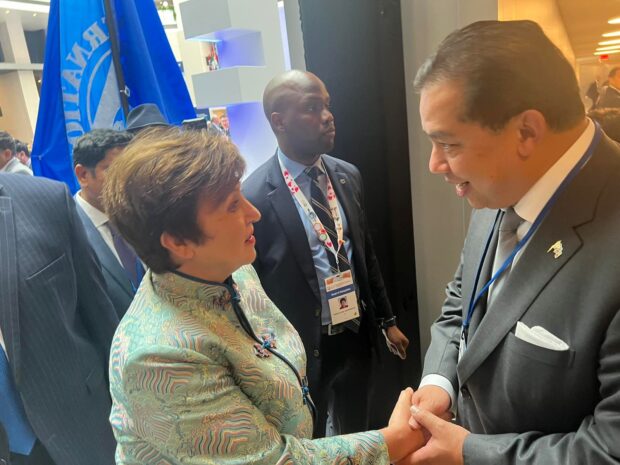
Speaker Ferdinand Martin G. Romualdez (right) and IMF Managing Director Kristalina Georgieva (left) shake hands and exchange pleasanties during their meeting at the Digital Public Infrastructure lecture on Saturday (Philippine time) at the International IMF headquarters in Washington D.C.
MANILA, Philippines–Speaker Ferdinand Martin G. Romualdez has called for a partnership between the Philippines, the United States, and India to build digital public infrastructure in the country.
Romualdez proposed the initiative during the Digital Public Infrastructure lecture at the International Monetary Fund headquarters in Washington D.C.
He said that nations have much to gain from this initiative and that it is very much aligned with President Ferdinand Marcos Jr.’s campaign promise to speed up the country’s digital transformation.
Romualdez noted that the House of Representatives has passed the E-Governance/E-Government Bill, which seeks to shift the entire bureaucracy to the digital space for faster and transparent delivery of services, and for better engagement with the public.
He added that digitalization will be the panacea to the economic problems left behind by COVID-19.
Digital public infrastructure allows people to engage in public and civic life in digital space. It is funded mostly by the government and taxpayers, unlike privately owned digital platforms that mostly rely on advertising.
Romualdez’s proposal was part of the World Bank-IMF Spring Meetings, where Finance Sec. Benjamin Diokno, Budget Secretary Amenah Pangandaman, Bangko Sentral ng Pilipinas Gov. Felipe Medalla, and National Economic and Development Authority Sec. Arsenio Balisacan attended and generated positive and encouraging remarks from businessmen, WB, IMF, and bank officials on the country’s strong economy.
According to Romualdez, Kristalina Georgieva, the Managing Director of the IMF, also conveyed her well wishes to the Philippines and its robust economy at the event.
Diokno, meanwhile, said the 2022-2028 Medium Term Fiscal Framework, which Congress passed shortly after it convened in July last year, serves as a compass to steer the economy closely along the path of fiscal sustainability and economic growth.
Last year, the economy posted “a 46-year record-high growth rate of 7.6 percent.” Diokno said this was higher than the full-year target of 6.5 percent to 7.5 percent and exceeded forecasts of local private sector analysts and international financial institutions, placing the Philippines among the best-performing economies in the Asia-Pacific region.
The growth target this year is 6 percent to 7 percent.